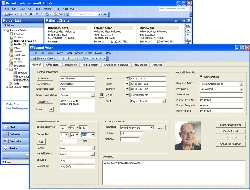 My wife and I went out for dinner the other night with our doctor and his wife. Actually, there was nothing unusual about this as we have known them for 25 years as good friends and neighbors. He practices Internal Medicine and I have always known him to be sincere about his work. I've met a lot of physicians over the years, several of whom are out for a quick buck, so it is refreshing to talk to one who is dedicated and takes his work seriously. Knowing of my background in systems and Information Technology he began to tell me about some recent changes in his practice that are affecting the very nature of his work. Frankly, I was disturbed with what I heard.
My wife and I went out for dinner the other night with our doctor and his wife. Actually, there was nothing unusual about this as we have known them for 25 years as good friends and neighbors. He practices Internal Medicine and I have always known him to be sincere about his work. I've met a lot of physicians over the years, several of whom are out for a quick buck, so it is refreshing to talk to one who is dedicated and takes his work seriously. Knowing of my background in systems and Information Technology he began to tell me about some recent changes in his practice that are affecting the very nature of his work. Frankly, I was disturbed with what I heard.
There are administrative changes underfoot in doctor offices that will ultimately affect us all. In a nutshell, the government is blackmailing doctors to provide extensive data about their patients. If they fail to provide it by certain deadlines, the government will withhold a percentage of their Medicare/Medicaid compensation which can be quite substantial. Even though the doctors realize this will be a burden to them, they also know resistance is futile.
Electronic records management is intended to improve patient health care simply due to the sharing of medical data on a national level. To illustrate, if a patient from Florida who suffers a problem away from home, such as in Ohio, local doctors can easily access the patient's medical records and treat him more effectively. There is only one problem with this, patient records are voluminous thereby making it laborious and time consuming to input.
The new reporting procedures require the doctors to personally review the records of each of their patients and input the data themselves, not an office manager or clerk. When completed, the doctors will be required to continually update the records using computer software. Even after the initial setup of patient data, which is no small task, asking physicians to update the records on an ongoing basis is considered a huge imposition and a distraction tending to interfere with the treatment of their patients. The technology for input is not conducive for simplifying the process and primarily consists of keyboards and mouse pointing devices. Voice-to-text has been around for some time, but it is not nearly at the level of sophistication required by physicians to stay on top of the task.
Another aspect that should be of consideration to American consumers is that the government will now have access to their medical records. They already have access to criminal and financial records, not to mention employment, citizenship and personal possessions (such as automobiles, housing and real estate). Now add in medical history and there will be little else the government will not know about us. Wow, talk about "Big Brother" watching. This should make all citizens gravely concerned about privacy and security issues.
Doctors are already being squeezed by insurance companies and malpractice attorneys. Now the government is going to add another level of bureaucracy to complicate their lives. So incensed are a lot of physicians about this that it appears a whole generation of doctors will likely abandon their practices over the next five years thereby radically disrupting patient care in this country.
"So, how are things in your business?" my Doctor friend finally asked.
I replied, "Not nearly as bad as I thought."
Keep the Faith!
Note: All trademarks both marked and unmarked belong to their respective companies.
 Tim Bryce is a writer and the Managing Director of M. Bryce & Associates (MBA) of Palm Harbor, Florida and has over 30 years of experience in the management consulting field. He can be reached at timb001@phmainstreet.com
Tim Bryce is a writer and the Managing Director of M. Bryce & Associates (MBA) of Palm Harbor, Florida and has over 30 years of experience in the management consulting field. He can be reached at timb001@phmainstreet.com
For Tim's columns, see:
http://www.phmainstreet.com/timbryce.htm
Like the article? TELL A FRIEND.
Tune into Tim's THE BRYCE IS RIGHT! podcast Mondays-Fridays, 11:30am (Eastern).
Copyright © 2011 by Tim Bryce. All rights reserved.
No comments:
Post a Comment